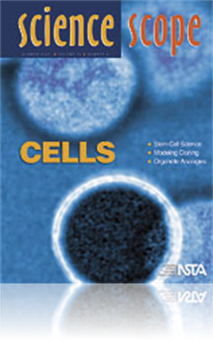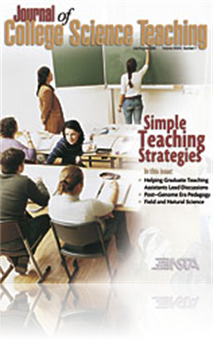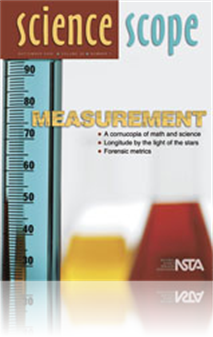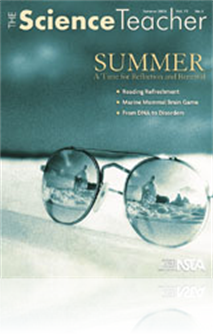All Resources
Journal Article
This article offers an opportunity to nurture the lifelong learner deep inside with a summer reading list that will allow you to renew, reflect, and refresh. NSTA Recommends reviewers share what they're reading this summer....
Journal Article
Who would have thought that a primary level science camp would spark exciting science programs for the more than 1,000 elementary students in one school district in Stephenville, Texas? This article details the development of a science camp for kinde...
Journal Article
Tech Trek: Testing the pH of soft drinks
Students will ooze with enthusiam as they explore acids and bases in soft drinks. To obtain a numerical value for pH, students can use a probe connected to a graphing calculator or computer as part of a hands-on investigation that they can identify w...
Journal Article
This article offers instructions on developing a board game centered on environmental stewardship and its science-technology-society implications. The board game, in which students in grades three through five work in cooperative teams to “save the...
Journal Article
Research and Teaching: Who Does Extra-Credit Work in Introductory Science Courses?
On the first day of classes, 81% of students in an introductory biology course claimed that they would submit extra-credit work if given the opportunity. When given two chances for extra-credit work, fewer than one-fourth of students submitted one or...
Journal Article
A Hitchhiker's Guide to the Invasive Plant Universe
Invade the science curriculum with Alien Invaders, a comprehensive activity that investigates invasive plant species and their ecological roles. Studying invasive plants can eliminate blind spots in the science curriculum. It is a theme that promotes...
Journal Article
Editor's Roundtable: Inroads to issues and tools for teachers
Scientific literacy is the overriding goal of both AAAS Project 2061 and the National Science Education Standards (NSES). Both project 2061 and the Standards advocate that students, as early as middle level, be provided opportunities to grapple with ...
Journal Article
Manna from Heaven or "Clickers" from Hell: Experiences with an Electronic Response System
Instructors used an electronic response system to enhance student-centered learning in large and small college biology classes. The system worked well to engage students in learning the subject matter and to assess their prior knowledge and misconcep...
Journal Article
Designing Teaching Facilities: Pedagogy as the Driving Force
Pedagogy, the art and science of teaching, should be the driving force behind the design of any teaching facility. What is taught and how it is taught should determine the size, type, and configuration of educational space. The statement seems obviou...
Journal Article
Editorial: Coming Soon -- Isn't Your Science Just a Theory?
Many of our fellow citizens believe that creationist claims deserve equal time with evolution in biology class. "After all, isn't evolution just a theory?" The federal government has spent billions on science education over the past 50 years. Curr...
Journal Article
So, You Want to Host a Family Science Night?
From recruiting volunteers to selecting activities and everything in between, this article offers tips on organizing a successful family science event at your school. It includes discrepant event activity examples, meant to probe, challenge, and clar...
Journal Article
Kekulé 's Dream and Bunsen's Burner
Connecting science to students’ lives has always been a major goal of teachers. Most introductory chemistry or physical science textbooks contain small paragraphs and sidebars about notable scientists or historical events, but these short snippets ...
Journal Article
Using Concept Maps in the Science Classroom
Create an exciting learning environment and help monitor students’ understanding with the use of concept maps. Concept maps provide a unique graphical view of how students organize, connect, and synthesize information. As a result, concept mapping ...
Journal Article
Methods and Strategies: Science First
Lesson chronology is key when combining science and literacy. For teachers involved in Colorado Springs, Colorado, Science Teacher Enhancement Program Unifying the Pikes Peak Region, STEP-uP professional development program for teachers, it is scien...
Journal Article
Summer is the time to work on next year with the luxury of time. This section gives an overview of ideas that involve time for preparation or coordination. This is time that November may not provide but that summer does....







